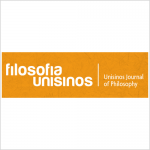Human nature between necessity and freedom
Vol 8, No 1 (2007) • Filosofia Unisinos - Unisinos Journal of Philosophy
Autor: Miriam Campolina Diniz Peixoto
Resumo:
Fragment DK 68 B 33, ascribed to Democritus of Abdera, states, “Nature and education are almost similar (he physis kai he didache paraplesion esti). For in fact education transforms human being (he didache metarhysmoi ton anthropon), and this transformation produces nature (metarhysmousa de physiopoiei).” The image of education as an activity that produces nature offered by the philosopher echoes his view of a world ruled at the same time by necessity and freedom. Necessary are the atoms and the void, the atoms’ movement in the void or the atomic compounds. The subsistence of the void in the compound bodies explains the residue of indetermination that minimizes atomistic determinism. The same structure and the same processes are repeated in the makrokosmos and the mikrokosmoi. This is a universe in permanent rearrangement (palin diakosmesis). Human beings are under the same rule: the atomic figures that configure their souls give them an even greater propensity toward transformation. In this article we examine some testimonies and fragments gathered by H. Diels in his book, Die Fragmente der Vorsokratiker that enable us to understand how Democritus saw human nature vis-à-vis freedom and necessity.
ISSN: ISSN: 1984-8234
Texto Completo: http://revistas.unisinos.br/index.php/filosofia/article/view/5806
Palavras-Chave: Democritus,human nature,freedom,necessity

Filosofia Unisinos - Unisinos Journal of Philosophy
The journal Filosofia Unisinos - Unisinos Journal of Philosophy is published once every four months by Universidade do Vale do Rio dos Sinos.
Articles must be original, unpublished, and not under consideration for publication anywhere else and can be written in Portuguese, English or Spanish
Filosofia Unisinos - Unisinos Journal of Philosophy prints articles, translations and critical book reviews. It also reprints papers that are considered fundamental to the area when authorized written permission is given by the original publisher.
